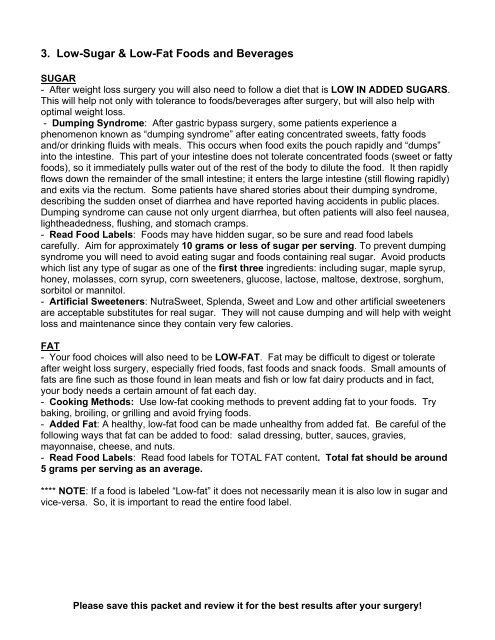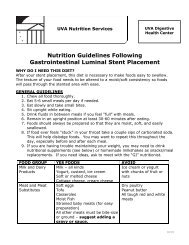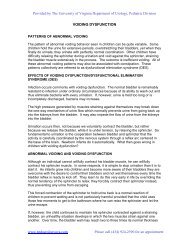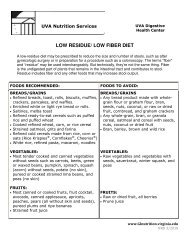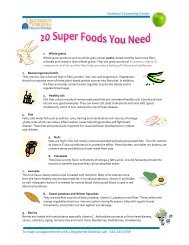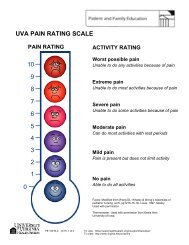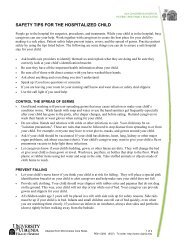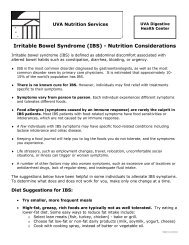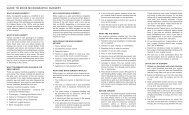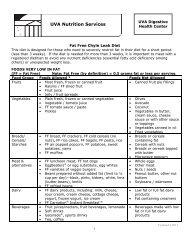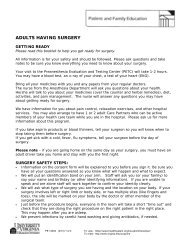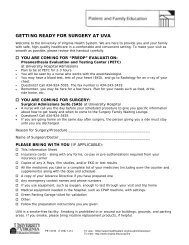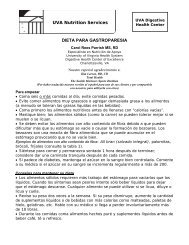Nutrition Guidelines after Gastric Bypass, Gastric Band
Nutrition Guidelines after Gastric Bypass, Gastric Band
Nutrition Guidelines after Gastric Bypass, Gastric Band
Create successful ePaper yourself
Turn your PDF publications into a flip-book with our unique Google optimized e-Paper software.
3. Low-Sugar & Low-Fat Foods and Beverages<br />
SUGAR<br />
- After weight loss surgery you will also need to follow a diet that is LOW IN ADDED SUGARS.<br />
This will help not only with tolerance to foods/beverages <strong>after</strong> surgery, but will also help with<br />
optimal weight loss.<br />
- Dumping Syndrome: After gastric bypass surgery, some patients experience a<br />
phenomenon known as “dumping syndrome” <strong>after</strong> eating concentrated sweets, fatty foods<br />
and/or drinking fluids with meals. This occurs when food exits the pouch rapidly and “dumps”<br />
into the intestine. This part of your intestine does not tolerate concentrated foods (sweet or fatty<br />
foods), so it immediately pulls water out of the rest of the body to dilute the food. It then rapidly<br />
flows down the remainder of the small intestine; it enters the large intestine (still flowing rapidly)<br />
and exits via the rectum. Some patients have shared stories about their dumping syndrome,<br />
describing the sudden onset of diarrhea and have reported having accidents in public places.<br />
Dumping syndrome can cause not only urgent diarrhea, but often patients will also feel nausea,<br />
lightheadedness, flushing, and stomach cramps.<br />
- Read Food Labels: Foods may have hidden sugar, so be sure and read food labels<br />
carefully. Aim for approximately 10 grams or less of sugar per serving. To prevent dumping<br />
syndrome you will need to avoid eating sugar and foods containing real sugar. Avoid products<br />
which list any type of sugar as one of the first three ingredients: including sugar, maple syrup,<br />
honey, molasses, corn syrup, corn sweeteners, glucose, lactose, maltose, dextrose, sorghum,<br />
sorbitol or mannitol.<br />
- Artificial Sweeteners: NutraSweet, Splenda, Sweet and Low and other artificial sweeteners<br />
are acceptable substitutes for real sugar. They will not cause dumping and will help with weight<br />
loss and maintenance since they contain very few calories.<br />
FAT<br />
- Your food choices will also need to be LOW-FAT. Fat may be difficult to digest or tolerate<br />
<strong>after</strong> weight loss surgery, especially fried foods, fast foods and snack foods. Small amounts of<br />
fats are fine such as those found in lean meats and fish or low fat dairy products and in fact,<br />
your body needs a certain amount of fat each day.<br />
- Cooking Methods: Use low-fat cooking methods to prevent adding fat to your foods. Try<br />
baking, broiling, or grilling and avoid frying foods.<br />
- Added Fat: A healthy, low-fat food can be made unhealthy from added fat. Be careful of the<br />
following ways that fat can be added to food: salad dressing, butter, sauces, gravies,<br />
mayonnaise, cheese, and nuts.<br />
- Read Food Labels: Read food labels for TOTAL FAT content. Total fat should be around<br />
5 grams per serving as an average.<br />
**** NOTE: If a food is labeled “Low-fat” it does not necessarily mean it is also low in sugar and<br />
vice-versa. So, it is important to read the entire food label.<br />
Please save this packet and review it for the best results <strong>after</strong> your surgery!


